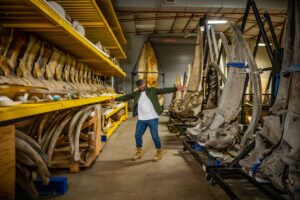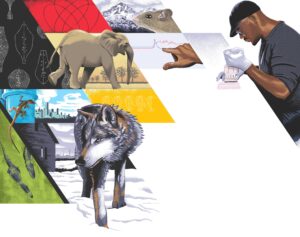Stories of evolution
Stories of evolution
Photo by Day’s Edge Productions
A conversation with Shane Campbell-Staton ’08

Photo by Day’s Edge Productions
This scholar, evolutionary biologist, and master storyteller uses classrooms and lecture halls along with podcasts, television, and film to attract a broad and diverse audience to science. His goal? To help people see how science plays such an important part in our past, present, and future.
Shane Campbell-Staton ’08, a biology professor at Princeton University, has dedicated his life to exploring human activity as a force for evolutionary change. He studies the Anthropocene—the geological period we’re in now—during which human activity has been the dominant influence on climate and the environment. His lab, the Campbell-Staton Group, looks at animal performance, gene expression, and genomics to understand how human activity affects evolution.
“We study all kinds of creatures—from Russian wolves to tuskless elephants to mountain mice—to learn about how various species adapt to urbanization, climate change, invasive species, and natural as well as human-caused events and disasters,” says Campbell-Staton. “Our work is like putting together a puzzle—each piece is important and, when they are linked, we get a bigger, better picture of our place in this world and our impact on it.”
Campbell-Staton hosted Human Footprint, a six-part PBS documentary series in which he traveled from farms to restaurants, high-tech labs to street markets, and ancient forests to the back alleys of big cities to gain insights into human nature, human impact, and what it means to be a human being. Audiences can also tune into Campbell-Staton on his ongoing The Biology of Superheroes podcast. Inspired by comic books, graphic novels, movies, and television, each episode tracks the boundaries of where science meets fiction.
In June 2023, Campbell-Staton gave the keynote presentation at the University’s Juneteenth Celebration, where he delved into the challenges he overcame at Rochester and elsewhere, the opportunities he’s cultivated, and the life lessons he’s learned along the way. He also discussed the connections between biology and human history, science, politics, economics, culture, and structural racism.
How did you get interested in science?
Growing up in Sumter, South Carolina, I didn’t have easy access to nearby woods or tidal pools, but I was captivated by science through television shows like those hosted by Steve Irwin and Jeff Corwin. My neighborhood was home to many small lizards, called anoles. So, TV and lizards were what first sparked my interest in science.
What important life lessons did you learn at Rochester?
One of the most important lessons was how to fail successfully. During my first year, I struggled with math, calculus, and chemistry classes, which left me feeling dejected after failing some of them. I even considered leaving school. However, my mother encouraged me to persevere and not quit because I was afraid to fail. Her support inspired me to spend the summer devouring high school science books to prepare for my sophomore year.
My goal—every day and in everything I do—is to try to expand thinking, spur curiosity, inspire action, and encourage others to never give up their quest for knowledge.

Illustration by David Hildreth
What do you think makes a great scientist?
A great scientist is not someone who has all the answers. In my personal statement to Harvard, I talked about how the giants of science are those who persevere when they hit a wall. I have experienced my share of failures and setbacks, but I have never given up. I am tenacious and curious, and I keep trying until I get it right. These qualities have helped me to succeed and get accepted into several graduate schools, including Harvard, where I earned my PhD and focused my dissertation on my favorite childhood lizard: anoles.
What sparked your interest in comic books?
As a graduate student, I was drawn to “Superman vs. Muhammad Ali” in a bookstore window in Harvard Square. I was intrigued and had to find out who won the battle. That launched my interest in comic books. After an intense day working on my dissertation, I really liked reading comic books and escaping into another world. One night during that time, I had a dream that combined science and superheroes, which led me to start the Biology of Superheroes podcast with Arien Darby ’07, a fellow comic book fan and friend I met at Rochester.
Who is your biggest role model?
I have many role models, but I have to say that my mother is the most important one. She has always encouraged me. When I was a kid, she told me that people can take just about anything from you. They can take your money, your power. But, she said, once you learn something, it’s yours—you get to keep it. And she underscored that you can actually give away what you know and still keep your knowledge.
Find out more
Watch Human Footprint on PBS
Listen to The Biology of Superheroes on Apple Podcasts
Watch Campbell-Staton’s Juneteenth REAL Conversations talk
Learn about the Black Alumni Network
This story also appears in the summer 2023 issue of Buzz magazine.
— Kristine Kappel Thompson, June 2023


